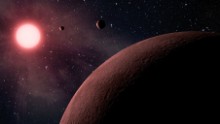NASA's Kepler mission finds 10 Earth-size exoplanets, 209 others

The NASA Kepler mission has discovered 219 more exoplanets, including 10 Earth-size planets, program scientist Mario Perez said Monday at NASA's Ames Research Center in California.
Ten
of the planets are potentially rocky, close to the size of Earth and
within the habitable zone of the stars they orbit -- meaning they could
support liquid water on their surface, Perez explained.
"The
Kepler data set is unique, as it is the only one containing a
population of these near-Earth analogs: planets with roughly the same
size and orbit as Earth," he said.
With
the addition of this latest release, Kepler has now identified 4,034
planet candidates, and 2,335 of them have been confirmed as exoplanets.
The mission has also found 50 candidates similar in size to Earth, with
more than 30 of them confirmed.
Of
the 10 newly discovered Earth-size planets, one is the closest to Earth
in size and the distance to its host star. But researchers don't know
much more than that.
In
comparison, our solar system looks like it has three planets in the
habitable zone of the sun: Mars, Venus and Earth. "I would only want to
live on one of those," said Susan Thompson, a Kepler research scientist.


No comments